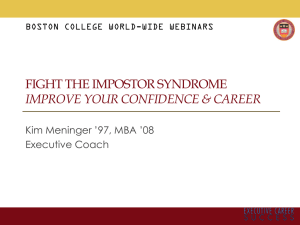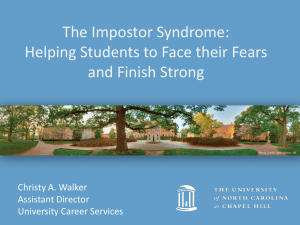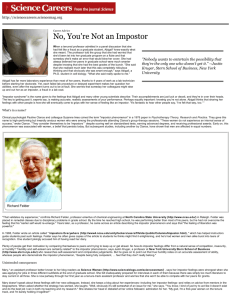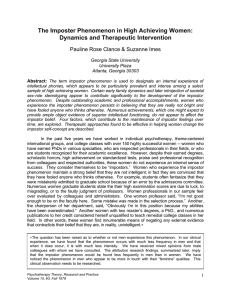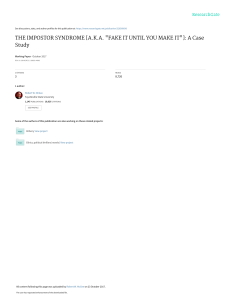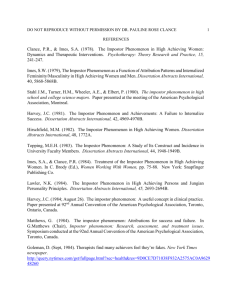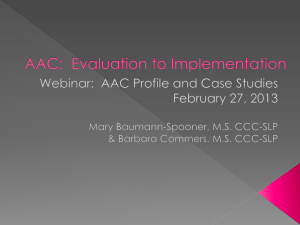Defeating the Imposter
advertisement
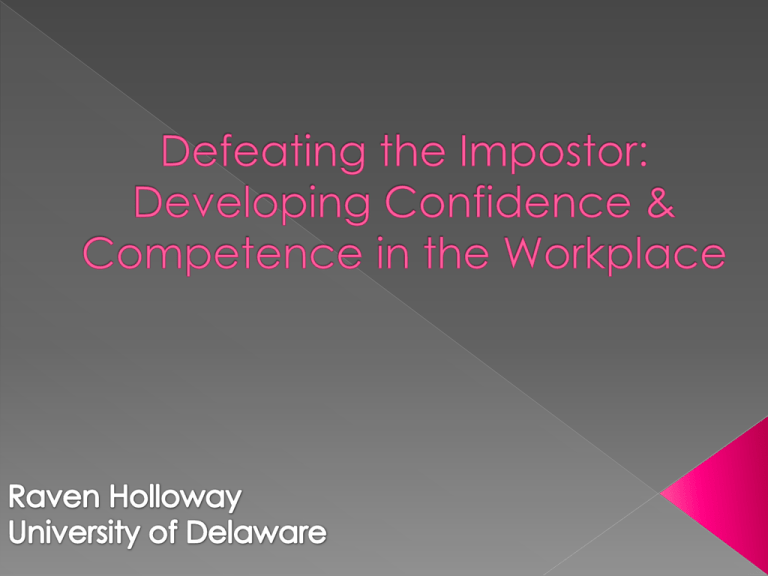
Introduce the concept of the Impostor Syndrome Explore how this has or can affect the life/work of a new professional or graduate student Introduce techniques one can utilize to develop competence and confidence in the work place Impostor Syndrome (also known as Fraud Syndrome) was introduced in 1978 by psychologists Pauline Clance and Suzanne Imes. It was a term used to describe high achieving individuals who lack self-confidence and often don’t feel that they deserve the success they earned. Often times individuals feel that their accomplishments are due to luck instead of their actual abilities and competence. Early studies first indicated that women felt like this the most Now it is found that both men & women will often feel this way Many graduate students/new professional often have strong feelings of being an impostor Self-doubt Sense of incompetence Fear Stress Unable to take credit for accomplishments; dismissing success as simply luck, good timing, or perseverance. I avoid evaluations if possible and have a dread of others evaluating me. I sometimes think I obtained my present position or gained my present success because I happened to be in the right place at the right time or knew the right people I rarely do a project or task as well as I’d like to do it. I’m disappointed at times in my present accomplishments and think I should have accomplished much more. When I’ve succeeded at something and received recognition for my accomplishments, I have doubts that I can keep repeating that success. I feel bad and discouraged if I’m not “the best” or at least “very special” in situations that involve achievement. Societal pressures Culture Family Class Age Gender Anything else? Break into small groups of 3-4 Answer the following questions: › Reflect on a time where you felt like an impostor at work: What caused this? Were you able to overcome it? How did it effect your job performance? Relationships? Accept it › Most professionals question their competence now and then. › Don't beat yourself up over it. Accept it as part of being human. › Questioning yourself can ensure that you are self aware and can identify ways in which you can grow. Assess Your Skills › Accurately assessing your performance is key to moving past the impostor syndrome. › Take Action: Document your competencies; document your successes. Each time you succeed, however small, take time to jot down the specific actions that led to success as well as what experience and qualities underlies your success at completing each action. Set SMART Goals for yourself Recognize that you are not alone. › Talk with other students/professionals. › Learn about their successes, failures, and concerns. › Social comparison can help you undersrand that others often have feelings of self-doubt or worry. › The tough part is to not let those questions detract from our work and our sense of competence. Understand your resources › Develop a strong and supportive network around you. This can include family members, a partner, colleagues, supervisors etc. This network will allow for you to lean on them and will give you the reality check needed › Identify a mentor Having a mentor is an important asset in your career. This person can help you to identify areas of growth, capitalize on strengths, and help you to plan out the next step. They often have lots of experience, so they too can help you adjust in times of adversity. Creating Your Legacy › Identify what you want to be known for; if you don’t know, begin to actively explore › Utilize your resources, mentors, and support group to help identify goals and keep you on track › Take advantage of opportunities that present itself for professional development and movement. These can include campus/departmental committees, projects, etc/ Accepting Failure › Failure is a normal aspect of life. › Being comfortable with it as well as being in an environment that is okay with it is an important step to feeling confident in the work place › Look at failure as a learning opportunity › “I look forward to failure” Clance, P.R., & Imes, S.A. (1978). The Impostor Phenomenon in High Achieving Women: Dynamics and Therapeutic Interventions. Psychotherapy: Theory Research and Practice, 15, 241-247. Clance, P.R. (1985). The Impostor Phenomenon: When Success Makes You Feel Like A Fake. Atlanta: Peachtree Publishers. Lawler, N.K. (1984). The Impostor Phenomenon in High Achieving Persons and Jungian Personality Principles. Dissertation Abstracts International, 45, 2693-2694B.
